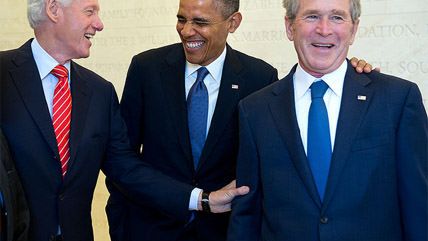Dick Cheney Doesn't Want You To Reflect on the Iraq War, So You Know It's a Good Idea To
Nearly a quarter century of American mistakes in Iraq

Now's not the time to re-litigate the Iraq War, we're told — mostly by people whose bright idea it was in the first place.
If we "spend our time debating what happened 11 or 12 years ago," says former Vice President Dick Cheney, we're "missing the boat."
Contra Cheney, it's important to examine our past mistakes, lest we get snookered into repeating them. Going back 11 or 12 years isn't enough — it's past time to reevaluate the Gulf War of 1991, the "famous victory" that helped get us into this mess.
"History will say we got this one right," former President George H.W. Bush declared in 2011. True enough, as the conventional wisdom evaluates our two Gulf Wars very differently: a "war of necessity" vs. a foolish "war of choice," a "good war," and its pointless and bloody sequel 12 years later.
But both wars were wars of choice — and bad choices at that.
After Saddam Hussein seized Kuwait in August 1990, it was natural to wonder whether restoring the Kuwaiti prince and protecting the Saudi monarchy was worth American blood and treasure.
But we were after much loftier goals, the first Bush administration insisted. Repulsing Saddam could, Bush 41 told Congress on September 11, 1990, usher in a "New World Order" — "a new era, freer from the threat of terror, … more secure in the quest for peace."
Then-Secretary of State James Baker offered a homelier rationale, all but embracing the left wing charge that the administration was bent on waging war for oil.
"We cannot permit a dictator … to sit astride [the Gulf's] economic lifeline," Baker contended, "if you want to sum it up in one word, it's 'jobs.'"
But, as David Henderson, former senior energy economist with Reagan's Council of Economic Advisers, explained in the run-up to the war, the "vaunted 'oil weapon' is a dud."
Avoiding war would, Henderson calculated, cost the U.S. economy "at most one half of one percent of GNP" — or an extra 24 cents per gallon at the pump.
Henderson's figures looked at the absolute worst-case scenario, which included an Iraqi conquest of Saudi Arabia.
At the time, the Pentagon claimed satellite photographs showed a quarter of a million Iraqi troops poised to roll across the Saudi border.
Reporter Jean Heller of the St. Petersburg Times decided to check. She purchased commercial satellite photos of the border region, which showed empty desert.
When she contacted the office of then-Secretary of Defense Dick Cheney for evidence to the contrary, "trust us," was the best the Pentagon could do.
"It was a pretty serious fib," Heller said later, putting it mildly.
The first Bush administration stopped short of Baghdad, convinced it wouldn't be prudent to become "an occupying power in a bitterly hostile land."
Still, Desert Storm pulled us into a deepening entanglement, including 12 years of debilitating sanctions and no-fly zones, punctuated by punitive air raids like 1998's "Operation Desert Fox."
Our Iraqi containment policy, including the long-term presence of U.S. troops on Saudi soil, became a rallying cry for Al Qaeda, among "Osama bin Laden's principal recruiting devices," as Paul Wolfowitz put it in 2003.
It's entirely possible that we'd still have faced a significant threat from Islamic terrorism even if we'd skipped the first Gulf War.
But today, with the Sunni radicals of the Islamic State of Iraq and Syria (ISIS) declaring the restoration of the caliphate and menacing Baghdad, it's hard to imagine we'd be doing worse.
Our "Twenty Years War" in Iraq is now going on a quarter century, and Bush 41's vision of "a new era, more secure in the quest for peace" is nowhere in sight.
This column originally appeared in The Washington Examiner.


Show Comments (12)